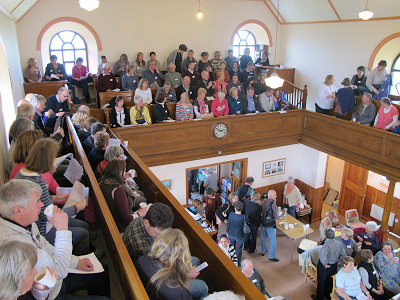< Small and informal | Series index | Eat together >
Victor Choudhrie asks us to share all we have. The Old Testament tithe is neither necessary nor sufficient, everything we have is to be at the disposal of our brothers and sisters in Christ. Indeed, we need to reach out beyond even this and care sacrificially for the community in which we live.
In his fourth step for transforming church, Victor Choudhrie suggests we drop the notion of tithing and begin to share all we have together.
Replace Mosaic tithing with Christian sharing, thereby harnessing the enormous, financial resources, hospitality and goodwill available in Christian homes.
Believe that God is going to work a work among the nations through you, which will leave you utterly amazed, and also provide resources for it. Deuteronomy 8:17-18; Acts 5:32-34; Habbakuk 1:5
If we've followed the first three steps we will already be meeting informally at home, and we are now being called to share everything in common.
Practical caring - This may seem like another huge step, and in some ways it is, but the blow is softened a little when we realise that the little group of believers meeting at home is already very like a family unit. In our family lives do we hesitate to share what we have with one another? No! This one's lack is met by that one's sufficiency, what could be better or more natural?
If a mother or father is willing to spend whatever they have for a son or daughter, or a son or daughter is willing to care for an elderly parent, why would a small gathering of believers be any different?
It happens entirely without planning or weighing up whether or not to help or how much to help. Where there is need it will be met as long as there are resources to meet it. If the resources run out the family suffers the shortage together. So it must be in local ekklesia (church). We are family.
Mosaic tithing - Under the law, the people were required to support the Levites and priests who had no land allocation in Israel. They would collect a portion of their harvest and animals and give them as an offering so that the temple worship could continue.
We can legitimately argue that tithing is part of the old covenant, so if we disregard other old covenant laws concerning circumcision, not eating pork, ritual cleansing, why do we insist on retaining tithing?
Just as the temple sacrifices have been met in full by Jesus' death so that we can now give ourselves as living sacrifices, and just as ritual cleansing has been met in full by Jesus' provision of living water, so too the tithe requirements have been fully met in Jesus who requires all we possess to support the royal priesthood of all believers.
We really can't have it both ways. Either we are required to give a fixed percentage or we are called to give everything. Which will it be? Before answering that question consider very carefully whether you want to take responsibility for your own future or whether you prefer to cast yourself on Jesus' mercy and and his call to enter his kingdom here on Earth.
Will you take the route of law or of grace? Is tithing law or grace? Is spending whatever you have to meet the needs of your brother or sister law or grace? Now make that choice - fixed percentage or all you have. The challenge will be to live by your choice.
As it was at the beginning - In the earliest days of the church it's clear that everything was shared in common, at least in Jerusalem (Acts 2:44).
This works well where everything is very informal. This is certainly the case for your family and it should also be the same in the local church. In places where there is oppression, persecution and danger it is the only way that works.
Here in the West, however, church has often been modelled on business. Money is required for buildings, staff, equipment and programmes; funds are raised to support these things. We spend most of these resources on ourselves and the remainder goes on missions and helping the local community.
We really need to turn this around so that the entire church becomes missional in nature, the mission is mostly local, and needs are met as they arise by everyone helping one another and sharing this kind of love more widely to friends, neighbours and colleagues.
Probable responses - How will we feel about freely giving to those who need it?
- People may feel anxious that they won't have enough remaining resources for their own needs.
- There may be a belief that it's the church's 'job' to collect funds and administer them and that it's wrong to give directly into a need. But what does the New Testament say about that?
- Some of us might worry that others would take advantage of our kind heartedness. How should we respond to this fear?
Questions:
- Are you willing to offer your time and your money to meet the needs of your brothers and sisters?
- Are you willing to offer your time and money to meet the needs of your neighbours?
- Are you prepared to divert funds from current church buildings, staff, equipment and programmes in order to meet the needs of those around you?
See also:
- Have you eaten your tithe yet? - Rethinking faith and church
- Love and other things - Journeys of heart and mind
- Mythology of tithing - Crossroad junction
< Small and informal | Series index | Eat together >







